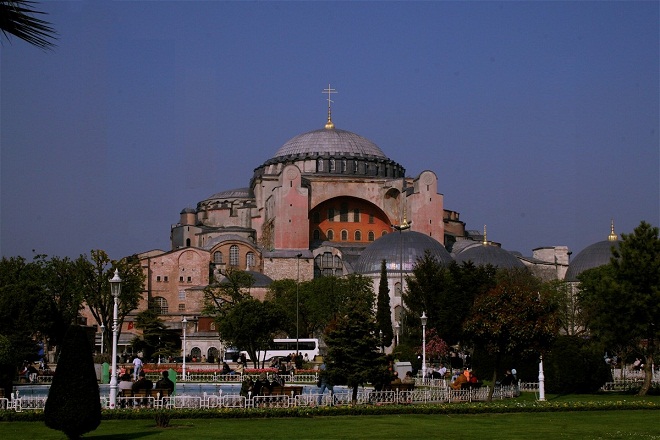Erdogan’s latest “pusch” for relevancy at home and in the region…….
Bolstered by his sense of Islamic supremacism, Erdogan is trying to create some measure of appeal for his continued role as leader of the Turks.
Hagia Sophia: Muslim Forgery vs Documented History
No, the ancient church was not “purchased” by Muslims, nor were its congregants “assured” of fair treatment.
Millions of Orthodox and other Christians around the world were either shocked, angered, and/or saddened to learn recently that Turkey has just approved the transformation of the Hagia Sophia museum—which was originally built, and for a millennium functioned, as an Orthodox cathedral—into a mosque.
In a long speech rationalizing this decision, which he personally spearheaded, Turkish president Erdogan said the following:
The conquest of Istanbul [Constantinople] and the conversion of the Hagia Sophia [Greek for “Holy Wisdom”] into a mosque are among the most glorious chapters of Turkish history. On May 29, 1453, [Ottoman] Sultan Muhammad II entered the city after a long siege and headed directly to the Hagia Sophia. As the Byzantines awaited their fate, fearful and curious, inside the Hagia Sophia, Muhammad entered the Hagia Sophia, giving assurances to the people regarding their lives and freedoms… [He then] recited the first adhan [call to prayer]. Thus he registered his conquest. Then, in a corner of the Hagia Sophia, he performed two prostrations out of gratitude. With this move he demonstrated that he had transformed the Hagia Sophia into a mosque…. The domes and walls of this great place of worship have resonated with prayers and takbirs [shouts of “Allahu Akbar”] for 481 years since then [until becoming a museum in 1934].
Such a pious recounting is only slightly less hagiographical than the position of leading Turkish historians, such as Professor Selim Akdogan. Recently on Al Jazeera he insisted that Sultan Muhammad had actually “purchased” the Hagia Sophia from its conquered Christian worshippers.
Are these rosy renderings accurate? Fortunately, we need not rely on Turkic propaganda; we have primary source documents describing exactly what the Turks and Sultan Muhammad did after conquering Constantinople and its Hagia Sophia in 1453. (All quotes in the following narrative were derived from contemporary sources, mostly eyewitnesses, as documented in chapter 7 of Sword and Scimitar.)
Once inside the city on May 29, 1453, the “enraged Turkish soldiers . . . gave no quarter”:
When they had massacred and there was no longer any resistance, they were intent on pillage and roamed through the town stealing, disrobing, pillaging, killing, raping, taking captive men, women, children, old men, young men, monks, priests, people of all sorts and conditions… There were virgins who awoke from troubled sleep to find those brigands standing over them with bloody hands and faces full of abject fury… [The Turks] dragged them, tore them, forced them, dishonored them, raped them at the cross-roads and made them submit to the most terrible outrages… Tender children were brutally snatched from their mothers’ breasts and girls were pitilessly given up to strange and horrible unions, and a thousand other terrible things happened. . .
Because thousands of citizens had fled to and were holed up in Hagia Sophia, the ancient basilica offered an excellent harvest of slaves, once its doors were axed down. “One Turk would look for the captive who seemed the wealthiest, a second would prefer a pretty face among the nuns. . . . Each rapacious Turk was eager to lead his captive to a safe place, and then return to secure a second and a third prize. . . . Then long chains of captives could be seen leaving the church and its shrines, being herded along like cattle or flocks of sheep.”

